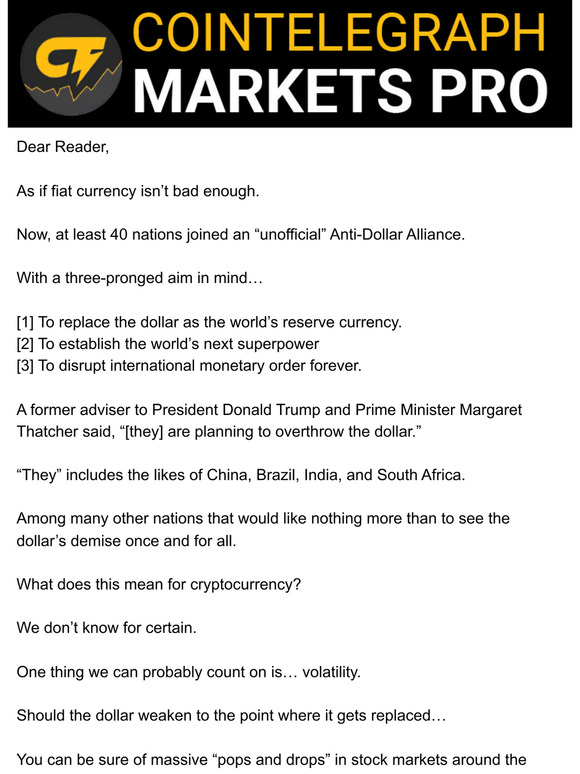Cryptocurrency's Resilience Amidst Trade Wars

Table of Contents
Cryptocurrency as a Hedge Against Geopolitical Uncertainty
The inherent volatility of global markets, exacerbated by trade disputes and sanctions, highlights the need for robust investment strategies. Cryptocurrencies, with their decentralized architecture, offer a compelling hedge against this uncertainty.
Reduced Dependence on Traditional Financial Systems
Cryptocurrencies operate outside the traditional banking system, making them less susceptible to government control and trade restrictions. This independence is a significant advantage during trade wars.
- Examples: Imagine a country imposing strict capital controls. Cryptocurrencies can facilitate cross-border transactions, circumventing these limitations. Decentralized exchanges (DEXs) further enhance this capability by operating without central authorities.
- The rise of decentralized finance (DeFi) platforms allows individuals to access financial services without intermediaries, strengthening the resilience of the crypto ecosystem against geopolitical shocks. Peer-to-peer (P2P) transactions also bypass traditional banking systems, offering another layer of resilience.
- Sanctions imposed on certain countries or entities can be circumvented (though ethically this is a grey area and should be considered carefully) using cryptocurrencies, provided the transaction doesn't violate existing laws. However, regulation around this is constantly evolving, making it crucial to stay abreast of legal updates.
Portfolio Diversification and Risk Mitigation
Including cryptocurrencies in a diversified investment portfolio can significantly mitigate the risks associated with trade wars and fluctuating fiat currencies. This diversification strategy reduces reliance on any single asset class, thus protecting against potentially devastating losses.
- Historical data reveals that during periods of geopolitical instability, some cryptocurrencies have demonstrated a capacity to maintain value or even appreciate, while traditional markets experienced significant downturns. This relative stability makes them an attractive asset for risk-averse investors.
- A comparison of crypto volatility to traditional markets during past trade wars shows that while crypto is inherently volatile, its fluctuations haven't always mirrored the dramatic drops seen in equities or fiat currencies. Careful asset allocation incorporating cryptocurrencies can therefore offer better overall portfolio resilience.
Increased Adoption During Times of Economic Instability
As global economic uncertainty escalates, the adoption of cryptocurrencies often increases. This reflects a "flight to safety," similar to the behavior observed with gold during times of crisis.
Flight to Safety
Investors often view cryptocurrencies, especially stablecoins pegged to fiat currencies, as a store of value during periods of market turmoil. This perception is driven by their independence from traditional financial systems and the potential for price appreciation.
- Historical data shows a surge in cryptocurrency adoption during previous periods of market turmoil. Investors seek refuge in assets perceived as less susceptible to the immediate impact of economic shocks.
- Stablecoins play a crucial role in this trend, providing a bridge between the volatile world of cryptocurrencies and the relative stability of fiat currencies. They offer a way to preserve value without the extreme price swings associated with more speculative crypto assets. However, even stablecoins are subject to risk, and their peg may not always hold.
Technological Advancements and Growing Infrastructure
Continuous advancements in blockchain technology and the cryptocurrency ecosystem are driving increased accessibility and user-friendliness. This contributes to greater adoption, especially during times of economic instability.
- Layer-2 scaling solutions improve transaction speed and reduce fees, making cryptocurrencies more attractive for everyday use.
- Improved user interfaces (UX) make it easier for individuals to engage with cryptocurrencies, regardless of their technical expertise.
- Growing regulatory clarity in several jurisdictions is also boosting confidence in the sector, attracting further investment and adoption.
Challenges and Considerations
While the resilience of cryptocurrencies amidst trade wars is noteworthy, it's crucial to acknowledge potential challenges.
Volatility and Price Fluctuations
Cryptocurrencies are inherently volatile, and prices can fluctuate dramatically. This volatility poses significant risks to investors.
- Effective risk management strategies, such as dollar-cost averaging (DCA), are vital to mitigate these risks. DCA involves investing a fixed amount of money at regular intervals, irrespective of price fluctuations.
- Diversification across various cryptocurrencies and other asset classes is also crucial in reducing overall portfolio volatility. Regulatory uncertainty adds another layer of complexity that impacts market behaviour and price.
Security Concerns
Security concerns, including hacking and scams, remain significant challenges within the cryptocurrency space.
- Best practices for secure crypto storage, such as using hardware wallets and reputable exchanges, are critical. Cold storage, which involves keeping crypto offline, is another crucial element of security.
- Caution is needed to avoid scams and fraudulent activities. Thorough research and due diligence are crucial before investing in any cryptocurrency project.
Conclusion
Cryptocurrency's resilience amidst trade wars stems from its decentralized nature, its potential as a store of value, and ongoing technological improvements. While volatility and security concerns remain, the strategic inclusion of cryptocurrencies in a diversified portfolio can offer a significant hedge against geopolitical uncertainty. By understanding the risks and implementing appropriate risk management strategies, investors can harness the potential benefits of cryptocurrencies during times of economic instability. Invest wisely in Cryptocurrency's resilience amidst trade wars and explore its potential as a hedge against global uncertainty. [Link to relevant resources here]

Featured Posts
-
 Bitcoin Price Prediction Analyzing The Potential For A 10x Multiplier
May 08, 2025
Bitcoin Price Prediction Analyzing The Potential For A 10x Multiplier
May 08, 2025 -
 Watch Oklahoma City Thunder Vs Houston Rockets Game Time Channel And Betting Guide
May 08, 2025
Watch Oklahoma City Thunder Vs Houston Rockets Game Time Channel And Betting Guide
May 08, 2025 -
 Lahwr Myn Ahtsab Edaltwn Ky Tedad Myn 50 Kmy Tshwysh Nak Swrthal
May 08, 2025
Lahwr Myn Ahtsab Edaltwn Ky Tedad Myn 50 Kmy Tshwysh Nak Swrthal
May 08, 2025 -
 Angels Hitting Woes Continue 13 Strikeouts In Twins Series Defeat
May 08, 2025
Angels Hitting Woes Continue 13 Strikeouts In Twins Series Defeat
May 08, 2025 -
 Malaysia Seeks Extradition Of Disgraced Ex Goldman Partner In 1 Mdb Scandal
May 08, 2025
Malaysia Seeks Extradition Of Disgraced Ex Goldman Partner In 1 Mdb Scandal
May 08, 2025
Latest Posts
-
 Jayson Tatums Honest Assessment Of Larry Bird A Boston Celtics Legacy
May 08, 2025
Jayson Tatums Honest Assessment Of Larry Bird A Boston Celtics Legacy
May 08, 2025 -
 New Commercial Jayson Tatum And Ella Mais Sons Birth Confirmed
May 08, 2025
New Commercial Jayson Tatum And Ella Mais Sons Birth Confirmed
May 08, 2025 -
 Alshmrany Yhll Tsryhat Jysws Hwl Antqalh Lflamnghw Fydyw Hsry
May 08, 2025
Alshmrany Yhll Tsryhat Jysws Hwl Antqalh Lflamnghw Fydyw Hsry
May 08, 2025 -
 Ella Mai And Jayson Tatum Announce Sons Arrival In New Ad Campaign
May 08, 2025
Ella Mai And Jayson Tatum Announce Sons Arrival In New Ad Campaign
May 08, 2025 -
 Nba Star Jayson Tatum Welcomes Son With Singer Ella Mai Commercial Reveal
May 08, 2025
Nba Star Jayson Tatum Welcomes Son With Singer Ella Mai Commercial Reveal
May 08, 2025
